The Film: The Driver (1978)
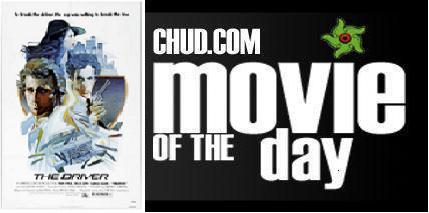
The Principals: Ryan O’Neal, Bruce Dern, Isabelle Adjani, Ronnee Blakely, Walter Hill (director)
The Premise: A getaway driver (O’Neal) is pursued by a cop (Dern) after a witness (Adjani) can’t identify him. So the cop hires some low rent crooks to get close to the Driver through “The Connection” (Blakely)
Is It Good?: Walter Hill’s aesthetic has been consistent from the start of his career to his more recent television efforts, and it seems to come from the top down – Walter Hill comes across as a Walter Hill protagonist. Action defines character. Not dialogue (which in this film may be at his sparsest), not back-story (again, no character here but Adjani has one. Her back-story is: “I had someone taking care of me, but the money’s dried up.”), nor really any exposition.
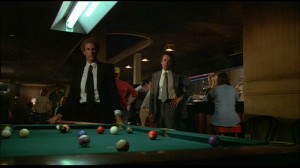
The Driver – to me – is one of the great zone-out films. I don’t mean that in a background noise sort of way, but like the endless steadicam shots of Danny riding the tricycle in The Shining, I find something very rhythmic and soothing about the film. After a night out, it’s one of my favorite films to put on to come down. That’s not because the film isn’t exciting – it is – but partly because of the way Hill went about making it. Edgar Wright showed the film at the New Beverly this last week, and got Walter Hill to come out. (Side note: Hill was so touched by the response that he came back to introduce The Warriors on Friday, to which the fan base for that was in full force. Hill was great, but even the positioning spoke to Hill. Lawrence Gordon, Frank Marshall, James Remar, and Joel Weiss were on one side of Edgar, where Hill stood alone on the other side often speaking without using his mike. As I said on twitter, after his introduction, I caught Hill’s eye as I was applauding, and we nodded at each other. Kind of meant the world to me. How could it not?). When asked about the film’s resemblance to Jean Pierre-Melville’s Le Samourai, Hill sort of shrugged. He knew it was there, but he also knew it was more than that, and he saw it more as a Western. I don’t totally buy that – the film is very movie savvy – but it’s also one of those films that doesn’t play as just homage – or beat you over the head with similarities. The main thing is that there’s a silent criminal, and he’s worked out a somewhat foolproof way of having the right witness to him being there. Though Le Samourai has some cat and mouse chasing, the cops and criminal never seem on the same footing. Here Dern is the yang to O’Neal’s yin.
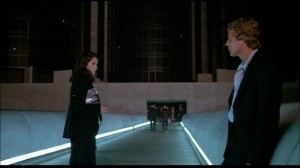
Dern plays the character as a loud know-it-all, who views catching criminals as a game made entertaining by the thrill of the hunt. He works mostly against fellow cop Matt Clark – Clark’s character fears the repercussions of failure – and because of that Dern (who has about 70% of the dialogue in the movie) can espouse on his philosophies and game plans. Felice Orlandi plays the third cop, and may have two lines in the whole movie (maybe none). Ronee Blakely’s character – “The Connection” (greatest name ever) – is the film’s other biggest homage. She’s a sideliner, a person in the racket but mostly clean, who hooks The Driver up with perspective clients. She’s playing a variation on Thelma Ritter’s character in Pickup on South Street, especially when she talks about how she won’t die for any of her clients. The women in the film almost seem like studio notes, and there’s no sexual energy between any of the leads, though there are sexual moments in the film (mostly of Blakely’s violation) – but no direct eroticism, only the heat that comes from attractive people posed well.
Perhaps the greatest sequence in the film is when Ryan O’Neal is asked how good he is. Dumb question. He takes three people for a ride, maneuvering a car around a parking lot like a professional dancer, and proceeds to take the car apart piece by piece. Literally knocking each bit of the car off in spite of the question asked. They want him to stop, but he’s being toyed with and so the results are that he must emphasize how good he is. O’Neal as an actor seems to have lucked into leading man status, but he could be used well. History has not been kind, as his stardom rested on Love Story – which is no longer remembered with any great enthusiasm. And yet O’Neal appeared in this, Barry Lyndon, Paper Moon, and Tough Guys Don’t Dance – all of which, for better or ill, are defining works by their filmmakers. O’Neal is now a TV guy, and I don’t know if there’s anyone willing to resurrect him, but his talents always came across as modest. The great thing about his work in The Driver is that he’s following the Alain Delon model, and is mostly a blank who doesn’t talk.
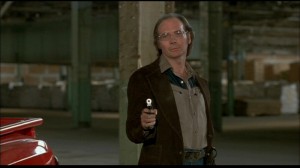
One of my favorite things about this film is also that it stars Joseph Walsh. For a while, I thought he was only credited with this and California Split (which he also wrote), but it turns out he’s got at least 40 acting credits – most of which were in TV – and appeared in Poltergeist. But Walsh has a great American face, and he’s paired with Rudy Ramos for most of his work in the film. He plays a scumbag professional thief used by Dern’s cop to hire O’Neal. His contempt for O’Neal is readily apparent, and Dern basically – and this is why the movie’s great – tells O’Neal that he’s the guy behind it all, and he lays out that it’s all a game to him – if O’Neal wins, hey, free money, if he loses, jailtime. O’Neal can’t resist.
This all leads to the ending – which has a train set piece that seems to be a slight reworking of a similar scene in The Getaway – where there’s a bag of money at a train station, and all the pieces come into play as Ramos’s character (which O’Neal has belittled) wants revenge, and everyone’s on The Driver – who gets teamed up with Adjani for an awesome warehouse chase. The payoff with films like this are always difficult, because morality suggests The Driver – who doesn’t actually steal, but does get people killed (though usually in self-defense) – is morally culpable, but not so much so that him getting shot would be satisfying, and we want to see Dern fail because he’s got so much hubris, but he’s also in the right. The film ends perfectly.
Is It Worth a Look: I don’t know if this is Hill’s best, but in a lot of ways, it’s everything he’s ever wanted to say or do with a movie. The Driver is Walter Hill’s manifesto, and if you can’t dig it, then you’re never going to get it.
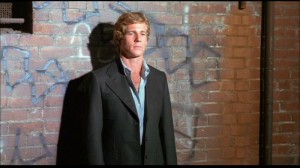
Random Anecdotes: In a couple of shots, Ryan O’Neal reminded me (for whatever reason) of Albert Brooks. Sadly, had the film starred Albert Brooks it might have been the best film of all time. Quentin Tarantino named a character Elle Driver (El Driver, The Driver) and stole a line about “catching the cowboy who’s never been caught” for Kill Bill.